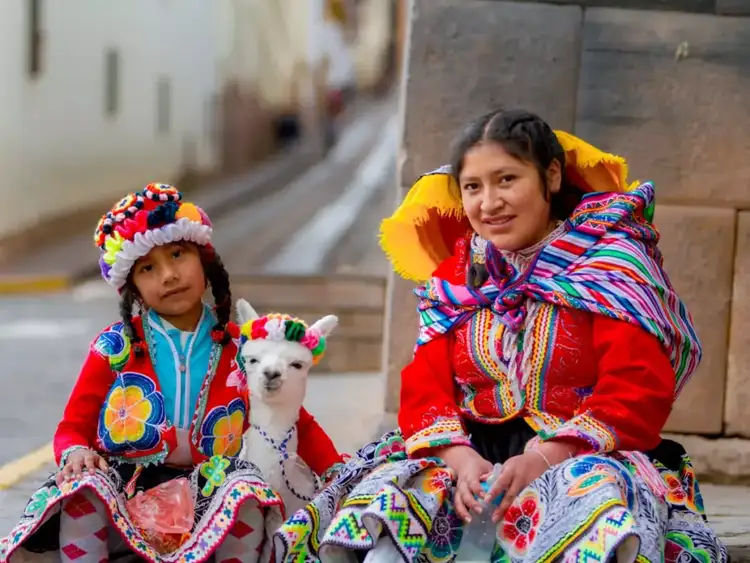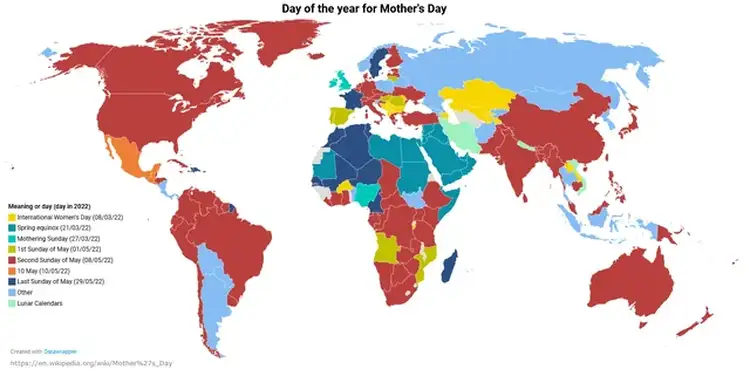News
Why is Mother’s Day Different in Different Countries? Exploring Cultural Variations and Traditions
Mother’s Day, a celebration cherished worldwide, manifests in various forms and dates, intriguingly divergent across nations. This cultural phenomenon raises a captivating question: Why is Mother’s Day different in different countries? Let’s discover the answer together with Alibay Store right now.
Historical and Cultural Roots:
Mother’s Day, as a celebration honoring maternal figures, has ancient origins deeply embedded in human history. Across various civilizations, from ancient Greece to Egypt, maternal figures were revered and honored through rituals and festivals.

However, the modern iteration of Mother’s Day, as we recognize it today, emerged in the early 20th century, primarily in the United States. Anna Jarvis, a social activist, is credited with pioneering the concept of Mother’s Day as a national holiday in 1908, as a tribute to her own mother and to honor the sacrifices of all mothers.
Since its inception, Mother’s Day has undergone a fascinating evolution, adapting to the cultural and historical context of each region where it is celebrated. While its roots may lie in American history, its observance has taken on diverse forms worldwide, reflecting the unique historical narratives and cultural values of each society. From the elaborate festivities in some countries to the more subdued and intimate gatherings in others, Mother’s Day continues to be a deeply cherished occasion, resonating with the universal theme of maternal love and appreciation.
Why is Mother’s Day Different in Different Countries? Influence of Tradition and Religion:
The observance of Mother’s Day is intricately intertwined with cultural traditions and religious beliefs, which significantly influence its practices and customs across different countries. In predominantly Catholic nations such as Spain and Italy, Mother’s Day coincides with the Feast of the Assumption of Mary, a religious celebration honoring the ascent of the Virgin Mary into heaven.

This convergence of events serves to highlight both earthly and divine motherhood, emphasizing the reverence for maternal figures in Catholic doctrine. Conversely, in countries like the United Kingdom and Ireland, Mother’s Day has its roots in the Christian festival of “Mothering Sunday.”
Originally observed on the fourth Sunday of Lent, this tradition dates back to the medieval era when servants were given a day off to visit their mothers and attend church services. Over time, Mothering Sunday evolved into a secular celebration focused on honoring mothers and maternal figures, regardless of religious affiliation.
The influence of tradition and religion on Mother’s Day underscores the dynamic interplay between cultural practices and spiritual beliefs, shaping the way in which this revered occasion is celebrated and commemorated across different societies.
Commercialization and Globalization:
The globalization of culture, coupled with the rise of consumerism, has profoundly impacted the observance of Mother’s Day worldwide. As holidays become increasingly commercialized, Mother’s Day is no exception, with businesses capitalizing on the occasion to promote products and services.

In many countries, there is a noticeable trend towards emulating the American model of extravagant gifts, lavish outings, and elaborate gestures to express appreciation for mothers. However, amidst this commercial frenzy, there exists a spectrum of approaches to celebrating Mother’s Day. While some individuals and cultures embrace the opulence and grandeur associated with the holiday, others prioritize simpler, more heartfelt expressions of love and gratitude.
These differences in approach reflect not only economic disparities between nations but also divergent attitudes towards consumerism and materialism. I
Sociopolitical Factors:
Beyond its familial significance, Mother’s Day often serves as a platform for addressing sociopolitical issues, particularly in countries grappling with tumultuous histories or ongoing social movements. In such contexts, Mother’s Day takes on a symbolic significance that transcends mere appreciation for maternal figures. Instead, it becomes an opportunity to advocate for women’s rights, maternal healthcare, and broader social justice issues.

For instance, in countries with a history of gender inequality or political unrest, Mother’s Day may be marked by rallies, marches, and public demonstrations, drawing attention to pressing societal challenges.
Women’s organizations and activist groups use the occasion to amplify their voices and demand policy changes that benefit mothers and families. Thus, Mother’s Day becomes not only a time for celebration but also a catalyst for social change, underscoring the pivotal role of mothers in shaping the fabric of society and the importance of advocating for their rights and well-being.
Adaptation to Local Customs:
Mother’s Day, as a cultural phenomenon, demonstrates remarkable flexibility in adapting to and incorporating local customs and traditions. Across different countries and regions, the celebration takes on diverse forms, reflecting the unique cultural identities and societal values of each locale.
In Japan, Mother’s Day is intricately intertwined with the ancient tradition of Hanako-san, a mythical figure symbolizing maternal love and devotion. On this day, children express their gratitude to their mothers by presenting them with carnations, which are regarded as symbols of affection and admiration.
The act of giving flowers, particularly carnations, carries deep cultural significance in Japanese society, representing heartfelt appreciation for maternal sacrifices and nurturing.
Similarly, in Ethiopia, Mother’s Day aligns with the end of the rainy season, a time of renewal and fertility in agricultural communities. Known as “Antrosht,” this celebration brings families together to mark the occasion with feasting, singing, and dancing.
It is a time to honor mothers and express gratitude for their role in sustaining the family and nurturing the next generation. The timing of Mother’s Day coinciding with the transition from the rainy season underscores the symbolic connection between maternal love and the abundance of nature, highlighting the vital role of mothers in fostering life and growth.
The kaleidoscope of Mother’s Day observance worldwide illustrates the rich tapestry of human culture and tradition. From its humble beginnings in the United States to its global proliferation, Mother’s Day has metamorphosed into a multifaceted celebration, reflecting the myriad expressions of maternal love and gratitude across diverse societies. So, while the date and customs may vary, the sentiment remains universal: honoring and cherishing the women who nurture and inspire us, wherever they may be.
Embrace the essence of Mother’s Day by celebrating the remarkable women in your life. Whether near or far, let your appreciation resonate with a thoughtful gift from Alibay Store. Explore our collection of heartfelt t-shirts, each designed to convey your gratitude in style. Shop now and make this Mother’s Day an unforgettable tribute to the extraordinary mothers, grandmothers, and mother figures who enrich our lives every day.
